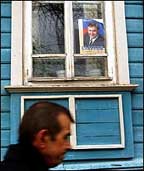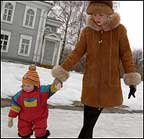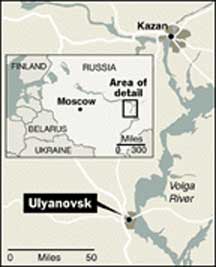|
 |
|
Esta página no está disponible en español. THE NEW YORK TIMES Only in Russia: 'None of the Above' Is on Ballot, and Wins By STEVEN LEE MYERS March 23, 2004
PHOTO: Yola Monakhov/Panos, for The New York Times A window at the Ulyanovsk headquarters of a national political party, United Russia, ULYANOVSK, Russia, March 21 — Russia's democracy may well be faltering, but its elections still allow the ultimate protest vote: "against all." In most races it attracts a few percent of contrary votes. Here in this faded industrial city on the Volga, it won. Twice. In the December parliamentary election, voters of District 181 threw out not only the incumbent, a retired general, but the rest of the pack as well. "Against all," the box at the bottom of the ballot, received nearly 20 percent of the votes, more than double what any of the 14 actual candidates won. On March 14, Ulyanovsk tried again. "Against all," by now a proven winner, increased its vote to 21.5 percent. The best showing among 12 challengers was under 13 percent. At a time when Russia's elections have become increasingly predictable and listless, that amounts to an unusual expression of discontent. In Ulyanovsk, at least, the "managed democracy" that President Vladimir V. Putin has nurtured since 2000 has proved a bit unmanageable. "At a minimum," said Aleksei G. Budovky, one of those against all, "it should sound like a warning to someone." Just what that warning means, and at whom it is aimed, is a matter of dispute, but the results have unquestionably made Ulyanovsk, 550 miles east of Moscow, the capital of Russian electoral contrarianism.
PHOTO: Yola Monakhov/Panos, for The New York Times An "against all" voter, Svetlana C. Volinchikova, and daughter walked near In December, two other parliamentary districts, in Sverdlovsk and St. Petersburg, voted "against all," but only Ulyanovsk refused for a second time to send anyone to Parliament. "Against all" also won five of six runoffs for the regional legislature. Ulyanovsk's obstinacy has embarrassed local election officials, not to mention the spurned candidates, many of them prominent public figures. They included Vadim I. Orlov, the incumbent; the former Communist governor of the region; the chief doctor of the city children's hospital; and a handful of businessmen. "I am sure there is somebody good enough," Svetlana S. Volinshikova, 30, said plaintively, having decided again that none of those on the ballot were. For her as for other voters, the results reflect a profound disillusion with the fate of this city of 657,000, and its leaders, since the collapse of the Soviet Union. Ulyanovsk was once an industrialized model of Soviet planning, churning out jeeps and airplanes and welcoming thousands of tourists to the boyhood homes of its namesake, Vladimir I. Ulyanov, who later became known as Lenin. The troubled transition to a market economy has stilled many factories in the city and ravaged the collective farms outside. The unemployment rate is officially 7 percent, but unofficially it is probably higher. Those who do work receive on average little more than $100 a month. Nearly 40 percent of residents live below the poverty line, compared with 25 percent nationwide. After the Soviet Union fell, the authorities here clung to elements of Communist central planning that were hostile to private enterprise. Some progress has been made since a new governor was elected in 2000, but life has generally been slow to improve. The city's heating system is erratic; its streets are dirty and potholed; snow removal is happenstance. Mr. Budovky, 43, works at the city's dilapidated airport, inspecting fuel for fewer and fewer airplanes. He makes $90 a month, plus a little extra by driving a taxi. He has little faith in the city's politicians. "All they want is to line their pockets," he said. "They build mansions and dachas. They live for themselves." Many of those struggling in today's Russia share that view, but more often than not, it seems, they simply opt out. Turnout in Russian elections, especially local ones, has been declining. The turnout here, though, was a respectable 56 percent. Mr. Budovky voted "against all," he said, to send a message to Moscow — "so that they finally understand that people do not live here; we only survive." Nikolai V. Sergeyev, chairman of the city's election commission, agreed that economic hardship and a declining quality of life had contributed to the protest vote, but he cited other factors too. There were too many candidates — "It's harder to get a driver's license than to qualify as a candidate," he said — and too few good ones, in his view. He lamented having to spend another $500,000 for another election, scheduled for December, saying the citizens "should show some maturity." Not surprisingly, he does not like the "against all" option. "There should be a choice: yes or no," Mr. Sergeyev said. "Now they have something else in between." __________ IMAGE: The New York Times Ulyanovsk joins in the new Russian democracy in its own way. When it comes to the state of Russia's democracy, there is perhaps an upside to all this. Ulyanovsk's elections have displayed a vigor absent nationally. The region has several private television stations and newspapers, which covered the races with verve compared with the homogeneity of the national coverage by government-controlled news media. Matvei K. Volodarsky, a member of the local legislature who campaigned for "against all," publishes five of the papers. He wielded them like a club to embarrass the governor. "It is not political nihilism," he said of the against-all voters. "They want finally to bring attention to this region. And they have succeeded." There is, of course, a limit to Ulyanovsk's electoral intransigence. In the presidential election, held on the same day, March 14, Mr. Putin received 66 percent of the votes here, not too much lower than his national showing of 71 percent. While some voters complained in interviews about the lack of a real alternative to Mr. Putin, fewer than 3 percent opted for "against all." "Somebody," Mr. Budovky explained, "has to be president."
|

 __________
__________ __________
__________